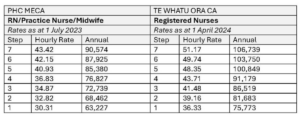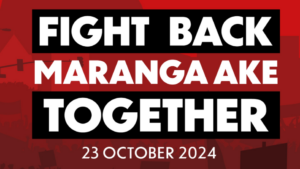| “Our members have rejected the three per cent pay rise offer because it does nothing to close the pay gap between our primary health-care nurses and our brothers and sisters working in mainly in hospitals for Te Whatu Ora,” said Morgan.
“So many of our members are feeling hōhā – they are fed up having to prove that every nurse, everywhere should be paid the same. This injustice has been going on for too long now.  “Many members are also giving up on their passion, their love for working in communities that they are heading closer to the edge of the cliff in hospitals.” The primary health care multi-employer collective agreement (PHC MECA) between the nurses and about 477 employers expired in June and negotiations with them began in August. “Employers told us they don’t have the money but that’s hard to accept when we see them driving even flasher and bigger cars than they were when we sat at the table with them last year for bargaining.
“Yes, the Government does need to increase funding to employers but employers are continuing to demand even more work from our nurses, without properly compensating them.” The employers were represented at the negotiation meetings by GenPro, Green Cross Health Ltd, The Primary Care Bargaining Collaborative and Teo Medical Care. As a result of the minimal pay offer, primary health care nurses throughout the country will be stepping up NZNO’s Maranga Mai campaign, by stopping work on October 23 to highlight the injustices of being treated by this Government as the “poor cousin,” said Morgan. “We are joining with the NZ Council of Trade Unions to bring together nurses and other workers in response to this Government’s cutbacks and attacks and serious lack of resourcing in health.
“There’ll be no one to keep people out of hospitals if primary health nurses move closer to the edge of the cliff and the low pay is forcing them to go there.” There is a $10,000 to $16,000 pay gap in annual salaries between what a Te Whatu Ora nurse is paid to what a primary health care nurse is paid, according to the latest figures from Te Whatu Ora. “Our brothers and sisters in Te Whatu Ora absolutely deserve this pay, even more actually. And like them, our primary health- care nurses deserve the same because they have done the same training and put in the same time,” Morgan said.
Dates for the next round of negotiations have not yet been confirmed, said Morgan.
Closing the pay gap is just one of several claims the bargaining team was trying to negotiate for members. Other claims include:
|
|
News
Primary health nurses ‘hōhā’ with three per cent offer
October 9, 2024
In te reo Māori, the word hōhā packs a lot of punch! It can mean many things but in this case it simply means ‘fed up!’ And it is the single word Tracey Morgan, spokesperson for the NZNO-Tōpūtanga Tapuhi Kaitiaki o Aotearoa primary health-care bargaining team, is using to describe the latest negotiations with employers of about 3500 nurses throughout Aotearoa.









